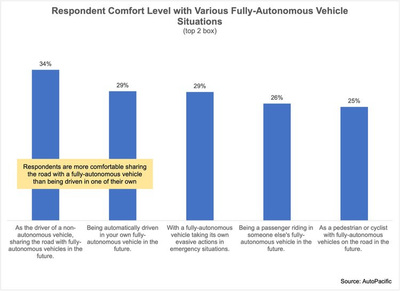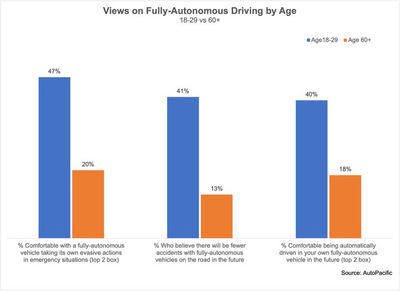Survey Says: Consumers Aren’t Comfortable Riding In Fully Autonomous Vehicles
 |
AutoPacific's recent study of U.S. drivers reveals only 29% of respondents would be comfortable being automatically driven in their own fully autonomous vehicle
LONG BEACH, CA, UNITED STATES, March 3, 2022 Fully autonomous vehicles are coming, but are drivers ready and willing to hand over the controls? In a recent study of over 600 licensed drivers aged 18-80 in the United States, noted automotive consulting firm AutoPacific gauged comfort with autonomous vehicles and investigated such topics as insurance responsibility, accident liability, price willing to pay and trusted automotive brands.
Rating their current comfort level, only 29% of respondents said they would be comfortable being automatically driven in their own fully autonomous vehicle in the future. A slightly lower 26% of respondents would be comfortable as passengers riding in someone else’s fully autonomous vehicle. “This is technology that most consumers are going to need to see and experience for several years before becoming comfortable,” says Ed Kim, President and Chief Analyst of AutoPacific. “It’s different than any other automotive technology that’s currently out there in that you’d be truly putting your vehicle in control of the drive one hundred percent.” Study results show that the large majority of respondents will wait until there’s a proven track record of reliability before embracing the technology.
Younger Drivers Are Most Comfortable with Autonomy
Age will play a major role in the future acceptance and adoption of autonomous vehicles as younger consumers are currently more comfortable with the technology. When asked about their comfort level being driven in their own fully autonomous vehicle, 40% of respondents aged 18-29 say they would be comfortable, while only 18% of drivers 60 and older say the same. Furthermore, 47% of respondents aged 18-29 say they would be comfortable with a fully autonomous vehicle taking its own evasive actions in emergency situations, compared to only 29% of slightly older respondents (age 30-39) and 20% of the oldest age group (age 60+). When asked if they believe there will be more or fewer accidents when fully autonomous vehicles are on the road, only 24% of respondents overall believe there will be fewer, compared to 41% of respondents aged 18-29.
Tesla, BMW and Toyota Most Trusted Brands for Autonomous Vehicle Development
Nearly a third of all respondents (32%) say they trust Tesla to develop a safe and reliable fully autonomous vehicle, followed by Toyota (19%) and BMW (18%). “Tesla’s reputation as a technology leader and the fact that its vehicles currently offer some degree of autonomous technologies, whether they reliably work or not, gives them the competitive edge with consumers when it comes to future full autonomy,” says Kim. Toyota’s strong brand reputation with older consumers and its reputation for robustness and reliability likely help it place in the top 3 overall, though respondents aged 18-29 are less likely to name the brand as a contender in autonomous development and more likely to choose Apple (20%), even though the technology giant doesn’t currently sell vehicles.
About AutoPacific
AutoPacific is a future-oriented automotive marketing research and product-consulting firm providing clients with industry intelligence and sales forecasting. The firm, founded in 1986, also conducts extensive proprietary research and consulting for auto manufacturers, distributors, marketers, and suppliers worldwide. The company is headquartered in Long Beach, California with affiliate offices in Michigan, Wisconsin, and North Carolina. Additional information can be found at http://www.autopacific.com.




